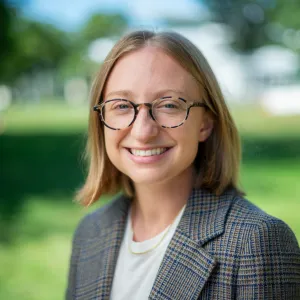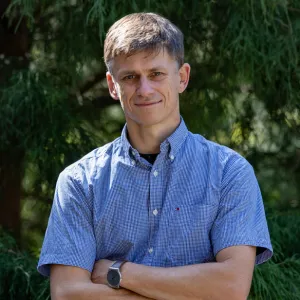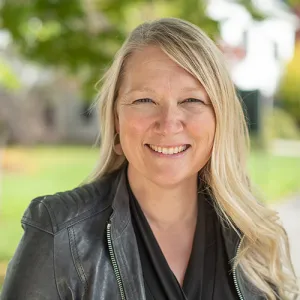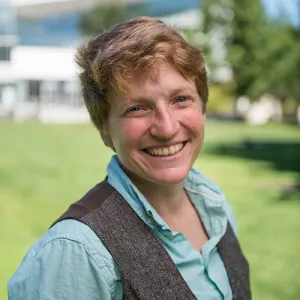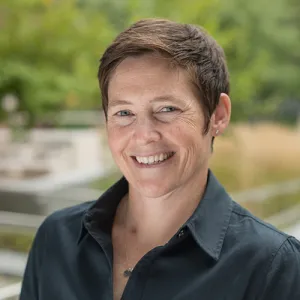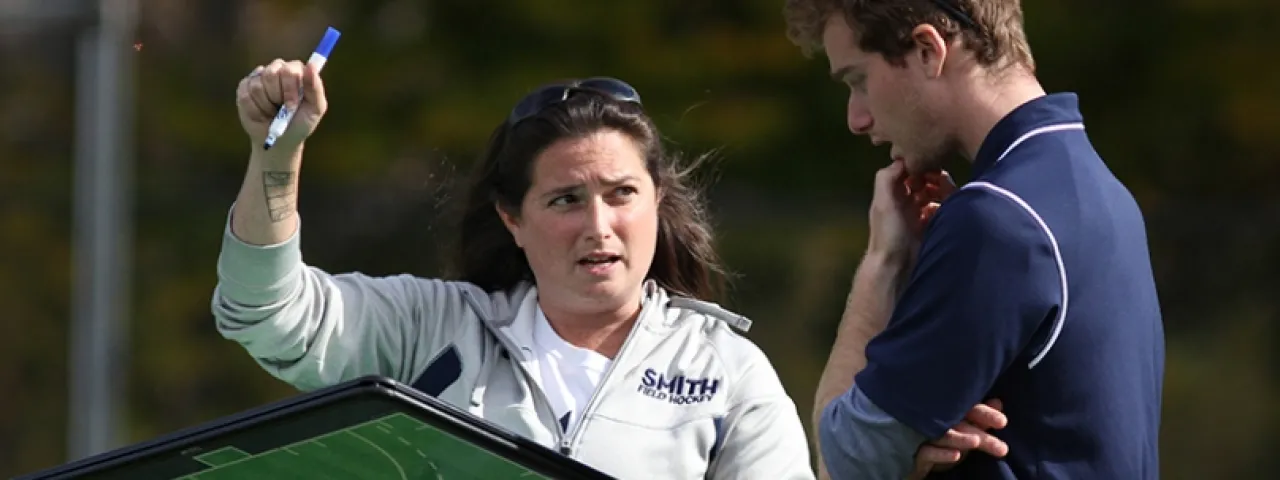
The S.M. in Exercise & Sport Studies
The Smith College master’s program in exercise and sport studies is devoted exclusively to the practice of intercollegiate coaching of collegiate women’s teams. Our goal is to produce quality intercollegiate coaches for female athletes. Students with diverse and high-quality undergraduate backgrounds who have had intercollegiate athletic experience as players and coaches are prime candidates for the ESS master of science degree.
The program is interdisciplinary by design, combining a background in social science and scientific information about exercise and sports with practical experiences encompassing all aspects of coaching. A unique and essential aspect of our program is that all students are required to engage in coaching work throughout the semester that makes up the practicum component of the degree. This practicum work is directly connected to the learning experiences students engage in within their classes. Graduates of the program are ideally suited to take on the role of head coaches and strength and conditioning coaches of intercollegiate teams.
Note: Smith follows the tradition of using Latin degree names. For most graduate degrees, this means A.M. (artium magister) and S.M. (scientiae magister). Smith’s graduate degree for exercise and sport studies is the master of science or S.M.
The Master’s Program
Since the passage of Title IX, the number of participants, sport opportunities, and programs for girls and women has grown dramatically. Over the last fifty years, programs at the intercollegiate athletic level for women have generally thrived as well. However, the percentage of women who serve as head coaches and administrators for these programs has precipitously declined. In 1972 more than 90 percent of women’s collegiate athletic programs were headed and coached by women. By 2005, these positions were filled predominantly by men, while women headed only two percent of the men’s teams. In 2024, the percentage of head coaching positions held by women throughout the NCAA hovered at 25%.
To address such inequities, Smith College, one of the largest undergraduate historically women’s colleges in the country, decided in 1985 to focus its master’s program in exercise and sport studies on training intercollegiate coaches of women’s teams. This was in keeping with the college’s mission to provide women with educational opportunities that lay the foundation for them to excel and take leadership roles in any occupation, particularly those in which they have been underrepresented.
The college already had many resources in place to address this need: an extensive library, a dedicated faculty, a highly qualified and diverse student population, and extensive computer and technological resources, all on a beautiful 143-acre campus. The current program offers a range of resources for sports and athletics that includes excellent outdoor and indoor facilities, a committed faculty in the Department of Exercise and Sport Studies and coaches in the Department of Athletics. The Department of Exercise and Sport Studies over the years has developed a rich curriculum that addresses the pedagogical and motor learning techniques critical for quality instruction, the sociocultural issues encountered in coaching, the biophysical knowledge base to properly train athletes, and the practical experience relevant to engage coaches broadly in the field of exercise, sport studies and athletics.
Since Smith has 11 intercollegiate teams, the program’s primary goal is to place candidates as assistant coaches at the college. With Smith’s membership in the Five College Consortium and its location in the Pioneer Valley, some graduate candidates may be placed at nearby institutions to gain professional experience and be exposed to a diverse group of coaches who use a variety of approaches toward their sports.
By combining multiple theoretical approaches and scientific information about exercise and sports with practical experiences encompassing all aspects of coaching, the program produces graduates who are ideally suited to work as head coaches of women’s intercollegiate teams. For the most part, candidates who have been willing to relocate, without restriction to a particular geographical area, have been successful in finding head coaching positions. Already more than 90 percent of graduates are now serving, or have served, as head coaches at numerous institutions across the country, from Division I to Division III. Follow-up evaluations with alumni and their athletic directors affirm the relevance of the theoretical and practical preparation gained through the program.
Located on the fourth floor of the Scott Building, the Human Performance Lab (HPL) is a space for teaching and research. The teaching lab houses many resources to give students hands-on experiences in exercise science, including metabolic testing, functional performance and health monitoring. The equipment includes Cosmed mobile and fixed metabolic measurement systems, treadmills, Monark cycle ergometers, blood pressure and heart rate monitoring tools, iWorx Data Acquisition and Analysis systems, and physical and virtual anatomical models.
Motor Neuroscience and Neuroimaging Laboratory (MNN Lab)
The MNN Lab is dedicated to advancing the understanding of the neural mechanisms of motor control. The equipment includes a 16x16 functional Near InfraRed Spectroscopy (fNIRS) imaging device (NIRx) to assess brain metabolism during motor production.
Is the stipend payment for being an assistant coach?
No. As part of being in the program every student is assigned to be an assistant coach or assistant strength and conditioning coach. The assignment is treated as any class (ESS 505/506). The student registers, and receives credit toward their degree.
What is the graduate award for?
Students receive a stipend as compensation for teaching one or more courses in the Exercise and Sport Studies Department. Tuition is decreased to between $0 and $10,000 each year.
Is it necessary to come to campus to interview?
It is not necessary to visit campus for an interview, but it is strongly recommended.
Is the GRE test score required for admission?
No. The GRE is optional for U.S. applicants. International applicants must submit TOEFL results.
Who should my three letters of recommendation be from?
Your three recommendation should include one that is sports related, from a coach or employer. Letters should highlight the applicant’s capacity for advanced study and potential for a future career in coaching.
When is the deadline for applying?
All required materials must be received by the Graduate and Special Programs Office at Smith College by March 1.
Can I enter the program in the spring?
No. Our courses are on a set program schedule. We only accept new students entering for the fall semester.
My undergraduate degree is not in a science field. Can I still apply?
Yes. We accept applications even if you don’t have a science background. You are not required to take prerequisite courses.
Does this program offer mentorships?
Yes. You are mentored by a head coach and multiple members of the Exercise and Sport Studies faculty throughout the 2 year program.
Can men apply to this program?
Yes! Anyone with a bachelor’s degree or its equivalent may apply to the ESS Graduate Program.
Are there other opportunities to shadow or volunteer within the athletic department?
Yes. The program functions out of the gym, home to the facilities manager. Opportunity to ask about operations management exists. However, no courses are based on operations as this program is centered around coaching athletic teams. We do have opportunities to lead physical fitness classes and TA undergraduate theory and performance courses. People can also do work in contest management, sports information, and event planning.
What is the student-to-teacher ratio?
Approximately 2 graduate students, depending on the year, shadow each coach. Classes are generally 12–25 students per class. Half of your courses would probably be on the lower end while half would have upwards of 20.
- Agnes Scott College
- Albany State University
- American International College
- Amherst College
- Barnard College
- Bates College
- Beloit College
- Bentley College
- Boston University
- Bowdoin College
- Brandeis University
- Brown University
- Bucknell University
- Cal Poly-San Luis Obispo
- Carleton College
- Case Western Reserve
- Coe College
- Colby College
- College of William and Mary
- Columbia University
- Concord Academy
- Cornell College
- CW Post University (NY)
- Dartmouth College
- De Pauw University
- Dean College of New Jersey
- Denison University
- Emerson College
- Fairfield University
- Hamilton College
- Hampshire College
- Hartwick College
- Harvard University
- Haverford College
- Hiram College
- Institute for International Sport
- Intercollegiate Tennis Association
- Iona College
- Iowa Weselyan
- Ithaca College
- Juniata College
- Kansas State University
- Keene State College
- King's College
- Lake Erie College
- Lake Forest College
- Le Moyne College
- Lewis and Clark University
- Lewis University
- Longwood University
- Macalester College
- Manhattanville College
- Marietta College
- Mary Washington University
- Massachusetts Institute of Technology (MIT)
- Mills College
- National Basketball Association
- North Park College
- Northwestern University
- Oberlin College
- Ohio State University
- Ohio Wesleyan University
- Oneonta State University
- Penn State University
- Plymouth State University
- Pomona Pitzer colleges
- Portland State University
- Princeton University
- Providence College
- Randolph Macon College
- Renssalaer Polytechnic Institute
- Rhodes College
- Skidmore College
- Smith College
- Southwest Texas University
- St. Benedicts College
- St. Catherine University
- Stevens Institute of Technolgy
- Swarthmore College
- Swedish Sports Federation
- Sweet Briar College
- Syracuse University
- The Connection Center, MN
- The College of New Jersey
- The Elms College
- The Naval Academy
- Trinity College
- Trinity University
- Tufts University
- U.S. Coast Guard Academy
- U.S. Merchant Marine Academy
- U.S. Military Academy- West Point
- U.S. Naval Academy
- U.S. Olympic Rowing Team
- University of British Columbia
- University of California Irvine
- University of California Santa Cruz
- University of Illinois
- University of Mary Washington
- University of Massachusetts
- University of Minnesota
- University of New Haven
- University of North Carolina
- University of Oregon
- University of Puget Sound
- University of Rhode Island
- University of Utah
- University of Virginia
- University of Wisconsin Lacrosse
- University of Wisconsin
- Vassar College
- Velocity Sports Performance
- Virginia Wesleyan College
- Washington & Lee University
- Washington College
- Wellesley College
- Wesleyan University
- Western Illinois University
- Wheaton College
- Williams and Mary
- Williams College
- Williston Northampton School
- Worcester Polytechnic University
- Yale University
The exercise and sport studies graduate program at Smith College received Level V NCACE (now known as USCCE) accreditation in 2021 and is recognized through the National Strength and Conditioning Association for its standardized curriculum in the strength and conditioning discipline.
Requirements & Courses
Each grad student in our program completes a competency-based matrix that was developed for coach education programs. Smith's ESS program is certified at the highest level—level 5—because we work so closely with these objectives.
Adviser: Erica Tibbetts
The master’s degree in exercise and sport studies is a 53-credit program tracked over the course of two years. A candidate receives theoretical and applied practice in coaching through 14 credits of a practicum experience by serving as either an assistant coach or a trainer to an intercollegiate team.
With the exception of 500, 502, 505, 506, 509, and special studies and theses credits, courses are offered on an alternate-year schedule.
Theory Courses
Full theory courses of 4 credits each include:
- 510 Biomechanics of Sport
- 515 Physiology of Exercise and Sport
- 550 Gender in Sport
- 565 Skill Acquisition and Performance
- 570 Sport Psychology
These courses typically meet for a minimum of three hours a week, and several require an additional two hours of laboratory work.
Seminars & Applied Skills
Applied coaching courses are largely 2 credits and are organized as seminars and colloquiums. They include:
- 500 Foundations of College Coaching
- 501 Seminar in Administration of Athletic Teams
- 502 Seminar in Philosophy and Ethics
- 503 Legal Issues in Sport
- 504 Collegiate Recruiting
- 509 Musculoskeletal Anatomy
- 520 Sport Leadership for Coaches
- 555 Sports Nutrition
- 575 Sports Medicine
- 576 Fundamentals of Conditioning
- 508 Counseling Basics: Skills Building for Coaches
Coaching Practicum
- 505 Practical Foundations in Coaching (first year)
- 506 Advanced Practicum in Coaching (second year)
Students in the coaching practicum serve as assistant coaches. Candidates in the coaching practicum in ESS 505 observe and assist the head coach in as many areas as possible. After having spent a season with a head coach and team, candidates in ESS 506 are given increased responsibilities. Here assistant coaches may be responsible for certain areas within their sport’s program, such as developing and implementing a recruiting plan, developing a budget, organizing a tournament, or planning and running practices.
Admission, Tuition & Aid
For more information on the master of science in exercise and sport studies program, please contact essoffice@smith.edu with your full name, city, state, year of graduation, and primary sport you are interested in, along with any questions you may have.
Learn about financial aid as a graduate student.
Not only were ESS instructors great professionals who were passionate and committed to their work, they were also exceptional people. The hands-on experience was invaluable, supporting our practice with a strong theoretical foundation.
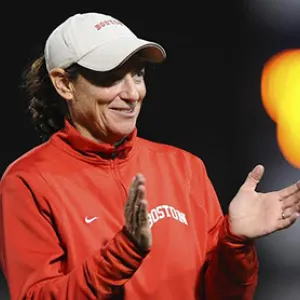
Faculty
Emeriti
Jackie Blei
Lecturer Emerita in Exercise & Sport Studies
Barbara Brehm-Curtis
Professor Emerita of Exercise & Sport Studies
Jim Johnson
Professor Emeritus of Exercise & Sport Studies
Chris Shelton
Professor Emerita of Exercise & Sport Studies
Don Siegel
Professor Emeritus of Exercise & Sport Studies
The exercise and sport studies program at Smith College was a positive learning experience that was vital to my professional development. The department puts young coaches in a position to immediately make an impact while furthering their education.
Contact Department of Exercise & Sport Studies
Scott/Ainsworth Gym
Smith College
Northampton, MA 01063
Phone: 413-585-3970 Email: essoffice@smith.edu
Office of Graduate & Special Programs
Operations Coordinator: Martha Potyrala
